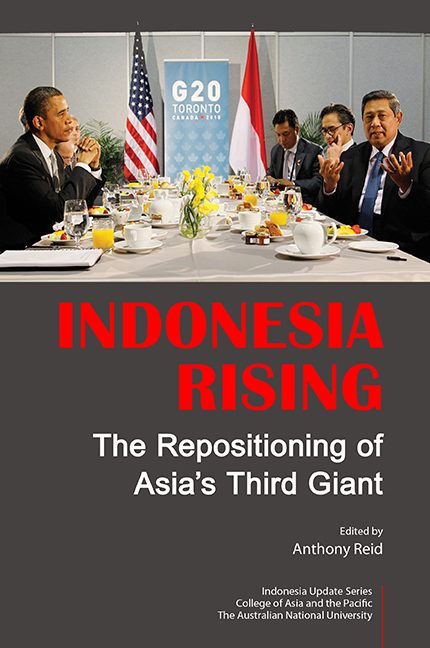Book contents
- Frontmatter
- Contents
- Tables
- Figures
- Contributors
- Foreword by Gareth Evans
- Preface
- Glossary
- 1 Indonesia's New Prominence in the World
- 2 Indonesia in the New World Balance
- 3 Indonesia's Role in the World Economy: Sitting on the Fence
- 4 Is Indonesia Rising? It Depends
- 5 Domestic Politics and International Posture: Constraints and Possibilities
- 6 Can Indonesia Lead on Climate Change?
- 7 Indonesian Muslims and Their Place in the Larger World of Islam
- 8 Indonesia's Quiet Springtime: Knowledge, Policy and Reform
- 9 Problems of Identity and Legitimacy for Indonesia's Place in the World
- Index
- INDONESIA UPDATE SERIES
7 - Indonesian Muslims and Their Place in the Larger World of Islam
Published online by Cambridge University Press: 21 October 2015
- Frontmatter
- Contents
- Tables
- Figures
- Contributors
- Foreword by Gareth Evans
- Preface
- Glossary
- 1 Indonesia's New Prominence in the World
- 2 Indonesia in the New World Balance
- 3 Indonesia's Role in the World Economy: Sitting on the Fence
- 4 Is Indonesia Rising? It Depends
- 5 Domestic Politics and International Posture: Constraints and Possibilities
- 6 Can Indonesia Lead on Climate Change?
- 7 Indonesian Muslims and Their Place in the Larger World of Islam
- 8 Indonesia's Quiet Springtime: Knowledge, Policy and Reform
- 9 Problems of Identity and Legitimacy for Indonesia's Place in the World
- Index
- INDONESIA UPDATE SERIES
Summary
With over 220 million Muslims, Indonesia has the largest community of Muslims in the world. Nevertheless, Indonesian Muslims do not play a role in global Muslim thought and action that is commensurate with their numbers. Indonesian Muslims have been eager to learn from Arab as well as Indian, Turkish and Persian thinkers, but do not seem to think they may have something valuable to offer in return. In Indonesian bookshops one finds the translated works of classical and modern Arabic authors, as well as studies of and by major Indian, Pakistani, Iranian and Turkish authors. But Malaysia is the only other country where one can find works by Indonesian Muslim authors, and there are virtually no serious studies of Indonesian Islam by scholars of other Muslim nations. The Arab world has shown a remarkable lack of interest in Asia in general, let alone in the social and cultural forms of Islam in Southeast Asia. Though more outward looking, other Muslim regions of Asia have not taken a serious interest in their Southeast Asian co-religionists either.
Indonesians are pursuing Islamic studies in India, Pakistan, Iran and Turkey, as well as in the Arab world and in the West. Indian and Turkish Muslims travelling to Indonesia, on the other hand, are not going there as students but as teachers and missionaries. Missionary movements such as the Ahmadiyya and the Tablighi Jama'at (both originating in India) and the Nur and Gülen movements (which started in Turkey) are active all over the world, as are the various transnational movements originating in the Arab world. But no corresponding Indonesian movement is attempting to spread its message beyond the confines of the country.
The apparent lack of interest in Indonesia as a great Muslim nation, and the reluctance of Indonesian Muslims to make their religious culture better known in the wider world, calls for an explanation. Indonesian Islam has a number of traits that have struck outside observers as unique and even enviable. One such observer was the late Pakistani-American scholar Fazlur Rahman (d. 1988). He was the intellectual mentor of a number of prominent young Indonesian intellectuals, most notably Nurcholish Madjid and Syafi'i Ma'arif.
- Type
- Chapter
- Information
- Indonesia RisingThe Repositioning of Asia's Third Giant, pp. 117 - 140Publisher: ISEAS–Yusof Ishak InstitutePrint publication year: 2012

